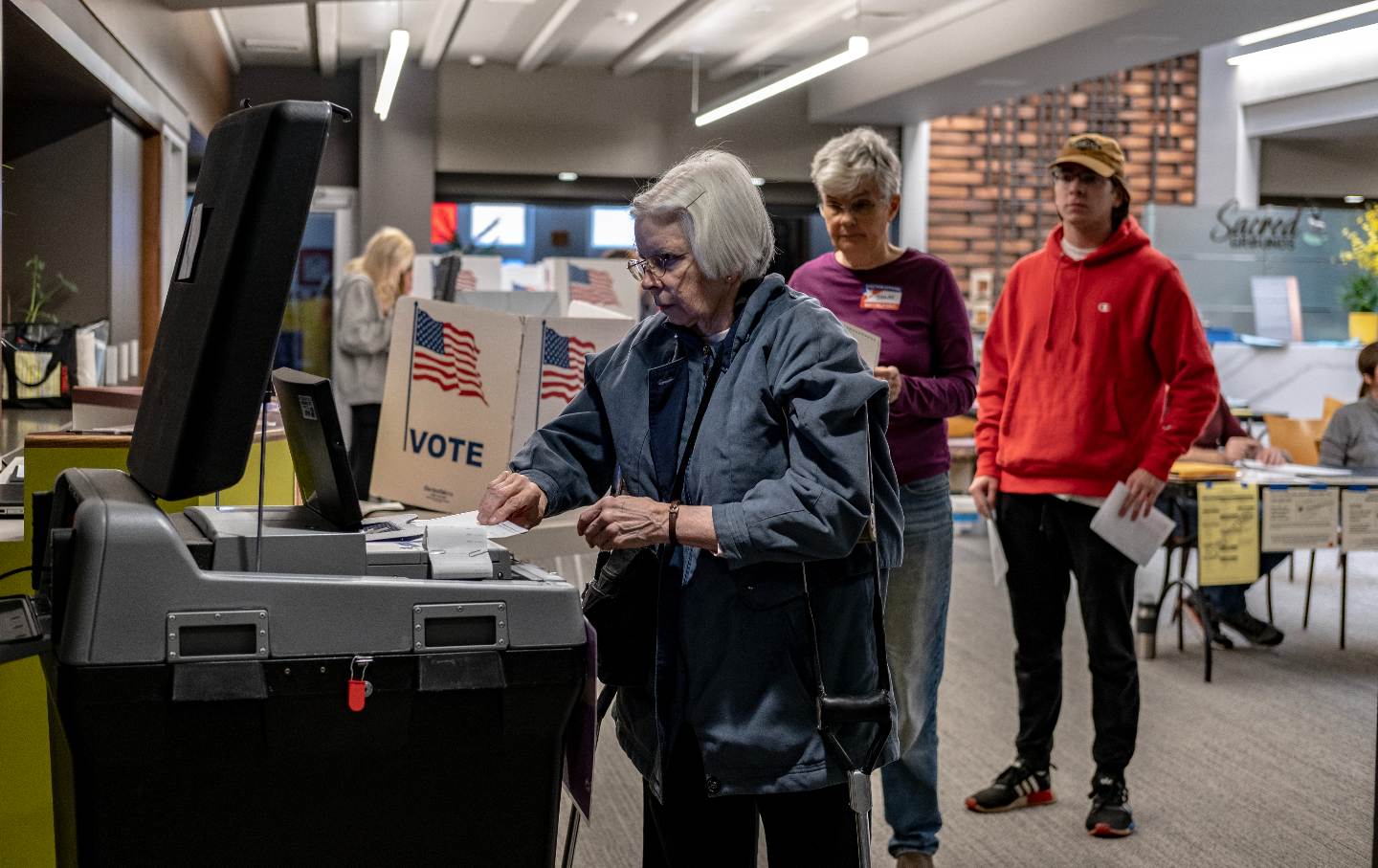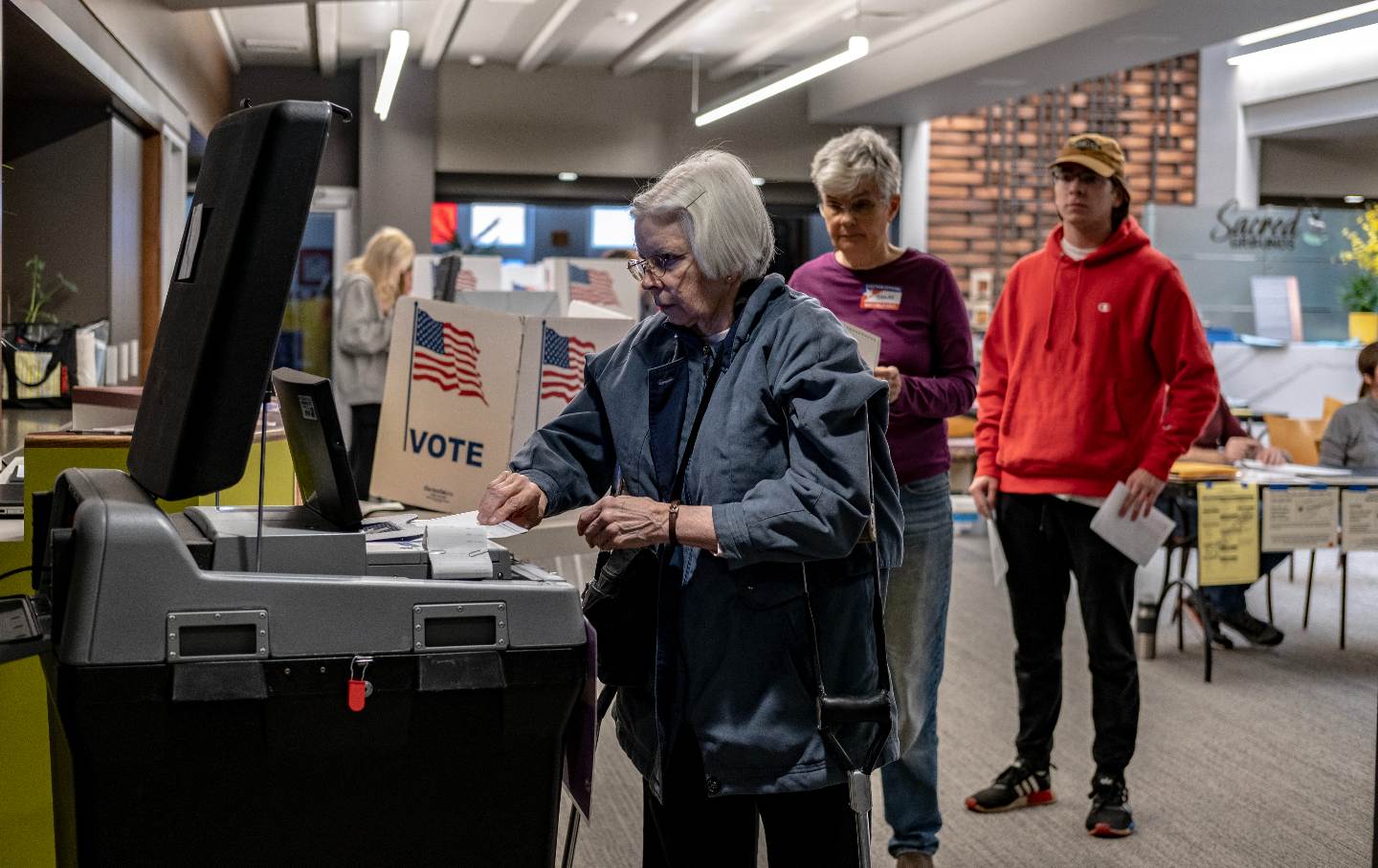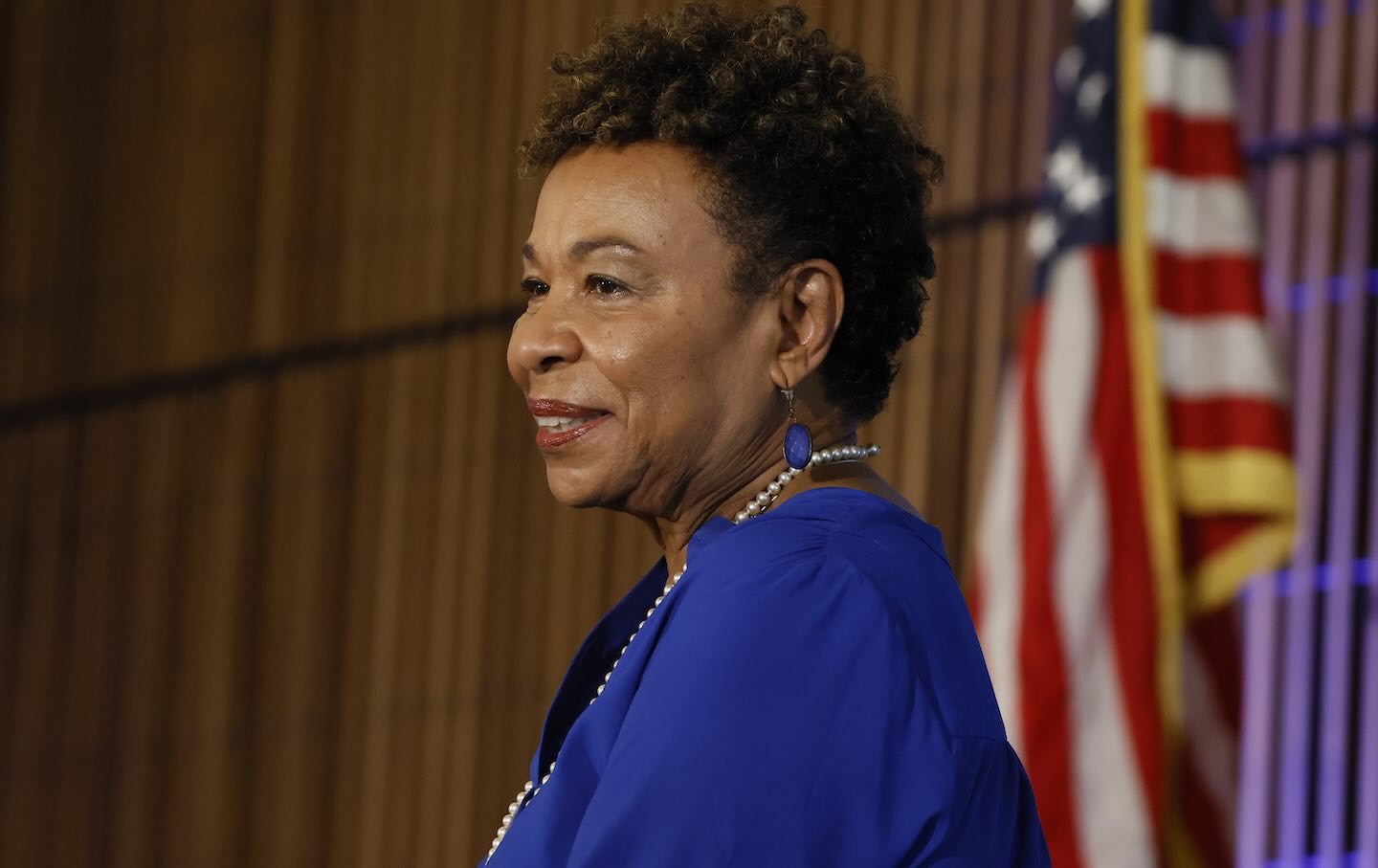
[ad_1]
Politics
/
StudentNation
/
September 6, 2024
The August partisan primary marked the second time since 1996 that voters in the state rejected a constitutional amendment.

Voters submit their ballots in Madison, Wisconsin.
(Jim Vondruska / Getty)
Wisconsin Democrats initially thought that defeating two constitutional amendments during the August partisan primary would be a long shot. In June, internal polling showed that both amendments were on track to pass—one by double digits. “It was not at all obvious that there was a path to defeat these amendments,” Ben Wikler, chair of the Democratic Party of Wisconsin, told The Nation.
Instead, they got a landslide. The amendments, which would have required the governor to receive legislative approval before spending federal funds, were defeated by 57-43 percent and 58-42 percent margins. It was only the second time since 1996 that voters had rejected a constitutional amendment in the state.
The amendments’ mostly conservative supporters argued that they would give necessary oversight over how Wisconsin spends federal funds. Opponents, meanwhile, said the amendments would bog down the governor’s ability to react nimbly to emergencies, particularly given the state’s endemic legislative gridlock.
In the spring, there was less of a concerted effort to rally against two other constitutional amendments that banned the use of third-party funding in election administration, according to Wikler. The party ultimately viewed those amendments as less consequential for Wisconsin’s future. “We didn’t lean into the fight in the same way, and they sailed through as per usual,” Wikler said.
But Wikler said there was an immediate sense that the two August amendments would “undermine our system of checks and balances” and prevent governors of either party from taking action in an emergency. The stakes were “vastly higher,” he said.
“It felt worth fighting, even if it was a long shot to win.”
Current Issue

Mobilizing against the amendments started as soon as the Democratic Party of Wisconsin voted to formally oppose them in June, Wikler said.
From there, the Democratic Party of Wisconsin spent $250,000 on broadcast and physical advertising; organizers with the Wisconsin Votes NO coalition, led by environmental group Wisconsin Conservation Voters, spent $1.9 million on mailers, digital advertising and field organizing. The effect of that organizing, Wikler said, was that Democrats not only defeated the amendments, but increased primary turnout.
“The turnout level was the highest that we’ve seen in an August primary in Wisconsin in a presidential election year for 60 years, since 1964,” Wikler said. “It wasn’t that people were coming out in droves on both sides of [the amendments]. This was a 15 point victory.”
Wikler said the political dynamics surrounding the amendments helped Democrats. Wisconsin’s state legislature is currently under Republican control, but Wisconsin’s governor, Tony Evers, is a Democrat. As the two parties have clashed, the statehouse has experienced severe gridlock. During the onset of the Covid-19 pandemic, the state had the nation’s least active legislature.
During that time, Evers spent or obligated 94 percent of the $5.1 billion federal aid he had control over, according to political outlet WisPolitics.
When he knocked on voters’ doors, Wikler said, he was sure to connect the amendments to Wisconsin’s political players and their intentions—answering who was supporting the amendments, and why. Once he explained that, in his view, the amendments are pushed by Republicans angry over Evers’s spending of federal Covid-19 relief funds, he said voters connected the dots: “There was like a light bulb going on for voters that had been genuinely confused about what these amendments were about.”
Ad Policy
Voters will decide the fate of more than 140 ballot measures across 41 states this November. In 10 of those states, voters will cast decisive votes on abortion rights.
When asked what advice he would give other state Democratic Party leaders facing conservative-backed constitutional amendments, Wikler says that informing voters proactively over a variety of mediums is key.
“Not only explaining the effects but explaining the intent is important, and using a full-spectrum organizing strategy—the way you would to win an electoral contest,” Wikler said. Localizing an issue helps: Municipal officials brought the messaging to voters, Wikler said, by highlighting how gridlocked federal pandemic funds could have forced cuts for caregivers, first responders, K-12 schools and small businesses.
Popular
“swipe left below to view more authors”Swipe →
And Democratic Party leaders shouldn’t assume their base knows what the amendments on their ballots do, Wikler said. “For constitutional amendments and ballot initiatives, you have to start with the recognition that most Democrats don’t know what’s happening.”
Given that primary and other non-November elections have much lower turnout, Wikler said votes should not be taken for granted: Democratic leadership should try to gain moderate and conservative votes, he said, while also knowing they still need to inform their base. Those most motivated to defeat or support an amendment will be most likely to vote, Wikler adds.
Even with the recent defeat, the constitutional amendments are expected to keep coming in Wisconsin. Robin Vos, a Republican and Wisconsin’s Assembly speaker, told local newspaper The Capital Times that Wisconsin Republicans should “double down” on putting forward constitutional amendments.
But in light of voters’ turnout in August, Wikler says Republicans’ doing so could ultimately invigorate future Democratic victories.
“One of the lessons from this: if Republicans really want to do something bad by amending the Constitution, it can actually blow back and cost them not only a victory of their constitutional amendments, but victories of other races as well,” Wikler said. “By promising a continued flow of these kinds of bad-faith attacks, Robin Vos is actually ramping up Democratic enthusiasm to remove his speakership.”
We need your support
What’s at stake this November is the future of our democracy. Yet Nation readers know the fight for justice, equity, and peace doesn’t stop in November. Change doesn’t happen overnight. We need sustained, fearless journalism to advocate for bold ideas, expose corruption, defend our democracy, secure our bodily rights, promote peace, and protect the environment.
This month, we’re calling on you to give a monthly donation to support The Nation’s independent journalism. If you’ve read this far, I know you value our journalism that speaks truth to power in a way corporate-owned media never can. The most effective way to support The Nation is by becoming a monthly donor; this will provide us with a reliable funding base.
In the coming months, our writers will be working to bring you what you need to know—from John Nichols on the election, Elie Mystal on justice and injustice, Chris Lehmann’s reporting from inside the beltway, Joan Walsh with insightful political analysis, Jeet Heer’s crackling wit, and Amy Littlefield on the front lines of the fight for abortion access. For as little as $10 a month, you can empower our dedicated writers, editors, and fact checkers to report deeply on the most critical issues of our day.
Set up a monthly recurring donation today and join the committed community of readers who make our journalism possible for the long haul. For nearly 160 years, The Nation has stood for truth and justice—can you help us thrive for 160 more?
Onwards,
Katrina vanden Heuvel
Editorial Director and Publisher, The Nation
Liam Beran
Liam Beran is a 2024 Puffin student writing fellow focusing on LGBTQ+ issues for The Nation. He is a journalist and student at University of Wisconsin–Madison.
More from The Nation

Trump’s gambit is bad, but Vance’s is even worse. He’s one of Ohio’s senators; these are his constituents. How can he endanger them like this?
Joan Walsh

The California Democrat cast the only vote against a blank check for endless war on September 14, 2001.
John Nichols

Laura Loomer’s strange journey from Trump stalker to Trump confidant.
Jeet Heer

A decade into his political career, Donald J. Trump is entirely at the mercy of his own BS.
Sasha Abramsky
[ad_2]